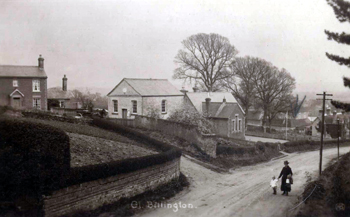Primitive Methodism in Billington

The Primitive Methodist Chapel with the school behind about 1900 [Z49/1015]
The Primitive Methodist chapel in Billington stood in Little Hill near the junction with the main road. The school stood just behind it. There was a Primitive Methodist meeting in the village before the chapel was built. On Sunday 30th March 1851 a census of all churches, chapels and preaching-houses of every denomination was undertaken in England and Wales. The local results were published by Bedfordshire Historical Records Society in 1975 as Volume 54, edited by D.W.Bushby. The return for the Primitive Methodists in Billington shows that numbers were good, despite the lack of a propert chapel. The return was made by local preacher John Read who stated that the meeting could house forty five sitting and twenty five standing. On the occasion of the census the congregation was thirty two in the morning and seventy in the evening. It wa sgenerally thirty five in the mornin gand seventy five in the evening (30th March 1851 was a wet, cold, unpleasant day). Read further noted: "The Primitive Methodist Society and Congregation was established in this place in 1848. the meetings are held in a private dwelling House".
Volume 110 published by the Bedfordshire Historical Records Society in 1996 and edited by Edwin Welch contains registrations of Bedfordshire nonconformist meetings drawn from a number of sources. A primitive Methodist chapel called Bethesda was registered by circuit minister William Birks of Leighton Buzzard on 29th April 1864, being cancelled on 5th August 1954. Birks registered meeting houses in Heath and Reach and Lidlington on the same day.
A circuit property book [MB1551] reveals that the chapel was built in the previous year, 1863, at a cost of £91/18/10, when there were just seventeen Primitives in the village. The chapel had space for a hundred, 36 in pews (which were purchased) and 64 in free seats. Average attendance was fifty and so clearly numbers were attracted from nearby villages.
A later property book [MB1537] notes that the land for the chapel was conveyed by Edmund Potts to the trustees on 2nd September 1863 (probably after the chapel was built). In 1932 Primitive Methodism and Wesleyan Methodism combined, along with the United Methodists, to form the Methodist Church of Great Britain. There was already a Wesleyan chapel in the village and to have two Methodist places of worship in so small a community was clearly an extravagance. The former Primitive chapel was sold in 1951. Today a bungalow stands on the site.